Middle East
Israel cuts off electricity supply to Gaza as new truce talks set to resume | Israel-Palestine conflict News
Israel’s Energy Minister Eli Cohen has ordered an immediate halt to electricity supply to Gaza, threatening the functioning of the enclave’s desalination plants amid an ongoing aid shortage in the holy month of Ramadan.
In a post on X, Cohen said he has signed an order to “cut off electricity to the Gaza Strip immediately”. “Enough with the talk, it’s time for action!” he added.
Sunday’s announcement comes more than a week after Israel cut off all supplies of goods to the territory to over two million people after reneging on the ceasefire deal that ended the 15-month-long Gaza war. Nearly 50,000 Palestinians have been killed and vast swathes of Gaza have been turned into rubble after non-stop Israeli bombardment.
Israel wants to extend the first phase of the three-phase deal, while the Hamas group wants the deal to move to phase two, as initially agreed by both sides. Analysts say Israel’s refusal to enter phase two shows its unwillingness to withdraw its troops from the Philadelphi Corridor, a narrow strip of land that separates Gaza from Egypt.
Hamas has accused Israel of “cheap and unacceptable blackmail” over its decision to halt the electricity supply to war-ravaged Gaza in an effort to pressure the group into releasing the captives.
“We strongly condemn the occupation’s decision to cut off electricity to Gaza, after depriving it of food, medicine, and water,” Ezzat al-Rishq, a member of Hamas’s political bureau said in a statement, adding that it was “a desperate attempt to pressure our people and their resistance through cheap and unacceptable blackmail tactics”.
Aid groups and rights campaigners have accused Israel of committing crimes against humanity and violating international humanitarian laws for cutting off aid.

People in Gaza are struggling to get bread and basic supplies as Israel’s total blockade has forced the closure of several bakeries and shops.
Al Jazeera’s Hind Khoudary, reporting from Gaza City, said that despite the end to the devasting air strikes on Gaza, civilians continue to suffer due to more than one week of Israeli blockade in place.
“Many Palestinians are unable to buy these products, and most of Gaza’s population is currently relying on food assistance.
“Food, water and electricity, all aspects of Palestinian life are being affected by Israeli actions,” Khoudary said, adding that the situation on the ground remains “catastrophic”.
Hamas has repeatedly called for an immediate start to negotiations on the ceasefire’s second phase. A Hamas source stated on Sunday that its delegation had now left for Doha, Qatar after talks in Cairo, Egypt.
Al Jazeera’s Tareq Abu Azzoum, reporting from Khan Younis, said the Hamas representatives were in Cairo to hold meetings with Egyptian officials on the possibilities of implementing the second phase of the ceasefire agreement.
“Hamas issued a statement agreeing to the establishment of a technocratic independent committee that will run the Gaza Strip and reiterated calls for the entry of humanitarian aid,” Azzoum added, saying that the group is also calling for Israel’s full withdrawal from the territory as part of any future deal.
Israeli Prime Minister Benjamin Netanyahu’s office, meanwhile, said it would send delegates to Doha on Monday.
Palestinians killed in Gaza
Earlier on Sunday, two Palestinians were killed in an Israeli attack in Gaza, according to an Al Jazeera correspondent, as fresh truce talks are set to resume in Doha from Monday.
The attack on Sunday in Gaza City’s Shujayea neighbourhood wounded several others, with doctors at al-Ahli Arab Hospital describing the condition of some of the injured as critical.
Israel’s military said its air strike targeted fighters who “were identified operating in proximity to [Israeli] troops and attempting to plant an explosive device in the ground in northern Gaza”.
Al Jazeera’s Khoudary said that Israel has continued to violate the ceasefire that came into effect on January 19. “According to official sources, since the beginning of the Gaza ceasefire, at least 116 Palestinians have been killed and at least 490 others wounded,” she said.
“This is why Palestinians are waiting for phase two of the ceasefire, when all Israeli soldiers are supposed to withdraw from all parts of the Gaza Strip.”
The six-week first phase saw the release of 25 living Israeli captives and eight bodies in exchange for some 1,800 Palestinian prisoners held in Israeli jails.

During the second phase, Hamas is expected to release all the remaining living captives, mostly male soldiers, in return for the freeing of more Palestinians held in the Israeli prison system. In addition, according to the document agreed to in January, Israel would initiate its “complete withdrawal” from Gaza.
The third phase will see the bodies of the remaining captives handed over in return for a three- to five-year reconstruction plan for Gaza to be conducted under international supervision.
On Sunday, United States President Donald Trump’s envoy Adam Boehler told NBC News that direct US meetings with Hamas in Doha on the release of captives in Gaza were extremely “helpful”.
Boehler stated that he believes something could “come together on Gaza within weeks”, but did not elaborate.
Trump had previously floated a widely condemned plan to expel Palestinians from Gaza, prompting Arab leaders to offer an alternative.
Their proposal would see Gaza’s reconstruction financed through a trust fund, with the Ramallah-based Palestinian Authority returning to govern the territory.
“We need more discussion about it, but it’s a good-faith first step,” Steve Witkoff, Trump’s Middle East envoy, told reporters in Washington in response to the Arab plan.
Witkoff will be returning to the region this week as he travels to Saudi Arabia for talks on the war in Ukraine.
Israelis rally
Meanwhile, family members of Israeli captives have demanded the government fully implement the ceasefire.
“The war could resume in a week,” Einav Zangauker, the mother of Matan Zangauker, told a crowd in Tel Aviv.
“The war won’t bring the hostages back home; it will kill them.”
Yoni Ben Menachem, an analyst based in West Jerusalem, says Israel’s return to ceasefire negotiations is a “genuine decision” by the government because it wants to secure the release of the remaining captives.
However, “the military option” remains on the table and that could be decided on Sunday evening when Israel’s cabinet meets, he said.
Hamas has said that it was ready to abandon its governance role in Gaza but refused to lay down arms.
Meanwhile, Israeli raids in the occupied West Bank have continued unabated. On Sunday, Israeli tanks entered areas in and around the village of Wadi Burqin, according to local media reports.
The ongoing Israeli operation in Jenin, Tulkarem and other areas began days after the ceasefire in Gaza, with dozens killed, hundreds of homes destroyed, and more than 40,000 people displaced.
Middle East
What are Putin’s conditions for a ceasefire in Ukraine? | Conflict News
Russian President Vladimir Putin said on Thursday that Moscow was in favour of the principle of a ceasefire in the war against Ukraine, as proposed by the Donald Trump administration in the United States, but raised questions he said the Kremlin needed answers to before it could commit to a truce.
He said Russia needed to discuss these questions and the terms of a peace proposal with the US.
His comments, the first on the proposed ceasefire, drew criticism from Ukraine and a muted response from Trump, who has oscillated between expressing confidence in Putin’s commitment to a peace deal and threatening Russia with new sanctions if it does not agree to a ceasefire.
Here is what Putin said, the conditions he laid out for Moscow to back a ceasefire, and how the US and Ukraine have reacted to his recent statement:
What is the US-Ukraine ceasefire deal?
On Tuesday, teams representing Washington and Kyiv met in Saudi Arabia’s Jeddah to negotiate terms for peace in Ukraine.
After this meeting, the two countries released a joint statement, proposing an “immediate, interim” 30-day ceasefire on the war front.
The statement placed emphasis on “the exchange of prisoners of war, the release of civilian detainees, and the return of forcibly transferred Ukrainian children” during the ceasefire period.
The document did not mention sanctions on Russia or security guarantees for Ukraine, but it did mention that Ukraine’s European allies would be “involved in the peace process”.
The document also did not specify what would happen with the Ukrainian soldiers in Russia’s Kursk.
What did Putin say about the ceasefire?
Nothing, for almost two days.
Then, on Thursday, at a news conference alongside Belarusian President Alexander Lukashenko, Putin responded to the ceasefire proposal.
He said the idea of a ceasefire was “correct” and Russia supported it, in principle. “We agree with the proposals to cease hostilities,” he told reporters in Moscow.
But, he added, “there are issues that we need to discuss, and I think that we need to talk about it with our American colleagues and partners, and, perhaps, have a call with President Trump and discuss it with him.”
What ‘issues’ does Putin want resolved before a ceasefire?
The Russian president outlined three questions and suggested that resolving them in a manner satisfactory to Moscow would be preconditions for the Kremlin to accept a ceasefire.
How will the Kursk incursion play out?
The first question Putin posed pertains to Ukrainian troops in the Russian region of Kursk.
In August last year, the Ukrainian army launched a surprise incursion into Kursk, seizing territory.
While the Russian army has now reclaimed 1,100 square km (425 square miles) of Kursk – almost the whole area that Ukrainian forces had grabbed – Kyiv’s troops are still present.
“Will all those who are there come out without a fight? Or will the Ukrainian leadership order them to lay down arms and surrender?” Putin questioned.
Will Ukraine mobilise troops and receive new weapons during the ceasefire?
Putin also suggested that a 30-day ceasefire could be used by Ukraine to mobilise new forces at a time when its troops are facing setbacks not just in Kursk but also in eastern Ukraine, where Russia has made slow, grinding gains in recent months.
During the news conference, Putin said “Russian troops are advancing in almost all areas of the front… So how will these 30 days be used? For forced mobilisation to continue in Ukraine, for weapons to be delivered there, for the newly-mobilised units to be trained? … How can we and how will we be guaranteed that nothing like that will happen? How will control be organised?”
Yuri Ushakov, Putin’s foreign policy adviser, also said on Thursday that the 30-day pause in fighting would only help Ukrainian troops regroup, deeming the ceasefire a “temporary respite” for the Ukrainian army.
In recent months, Ukraine has suffered manpower shortages. In January, Ukrainian troops retreated from Kurakhove, a town in Ukraine’s Donetsk region, when Russian troops claimed control.
Who will verify the ceasefire?
Putin also questioned how the ceasefire would be monitored and who would ensure that both parties are following the agreement.
“We proceed from the fact that this cessation should be such that it would lead to long-term peace and eliminate the original causes of this crisis,” he said.
“Who will give orders to stop hostilities? … Who will determine where and who has violated a possible ceasefire agreement for 2,000 kilometres (1,243 miles)?”
How has the US reacted?
Putin’s comments came shortly after US President Donald Trump’s special envoy Steve Witkoff arrived in Russia to meet with Putin and other Russian officials. Although Witkoff is officially Trump’s Middle East envoy, he has also been involved in Russia relations.
Last month, he became the first high-level US official to travel to Russia since its 2022 invasion of Ukraine. During this visit, he secured the release of Marc Fogel, an imprisoned American, in exchange for the US releasing imprisoned Russian Alexander Vinnik. Witkoff was also part of the US team during negotiations with Russian officials in Saudi Arabia.
On Thursday, at the beginning of a meeting with NATO Secretary-General Mark Rutte, Trump said that Putin had released “a very promising statement, but it wasn’t complete”.
“Now we’re going to see whether or not Russia’s there. And if they’re not, it’ll be a very disappointing moment for the world.”
Also on Thursday, US Treasury Secretary Scott Bessent told CNBC that Trump is “willing to apply maximum pressure on both sides”, including sanctions on Russia.
Since the beginning of the war in February 2022, the US and its allies have imposed at least 21,692 sanctions on Russia, targeting individuals, media organisations, the military sector, energy sector, aviation, shipbuilding and telecommunications, among other sectors.
Last week, the US temporarily suspended military aid and intelligence sharing to Ukraine, after a White House meeting between Trump and Ukrainian President Volodymyr Zelenskyy spiralled into acrimony.
The aid and intelligence sharing were restored after the US and Ukraine jointly agreed on the 30-day ceasefire agreement in Jeddah.
How has Ukraine reacted?
In his nightly address posted on X on Thursday, Zelenskyy said that Putin is “preparing to reject” the ceasefire proposal.
“Putin is afraid to tell President Trump directly that he wants to continue this war and keep killing Ukrainians,” said Zelenskyy.
Marina Miron, a post-doctoral researcher at the defence studies department of King’s College London, said it would make sense for Russia to stall on a decision about the ceasefire.
“Until the ceasefire is implemented and everybody is on the same page, time will pass, which will probably give the Russians the necessary time to at least get Kursk back so that it removes any potential negotiating bonuses for Ukraine,” Miron told Al Jazeera on Wednesday.
In his address, Zelenskyy added: “Now is the time to increase pressure on him [Putin]. Sanctions must be applied – ones that will work.” The Ukrainian leader said his country is willing to continue working with its US and European partners to further the peace process.
Could the US and Ukraine accept Russia’s peace terms?
It’s unclear. But some experts believe that Trump’s track record suggests that the US could try to accommodate Putin’s concerns. If that happens, Ukraine might have no choice but to accept this.
“If past performance is any guide, [Russia’s] demands will be backed by the US,” Keir Giles, a senior consulting fellow at the London-based Chatham House think tank, told Al Jazeera on Wednesday.
“I think that the Trump administration has shown to Ukraine very clearly that Ukraine is not going to dictate the rules after the debacle in the Oval Office,” Miron added.
Middle East
Hamas ‘ready’ to hand over Israeli captive and four bodies held in Gaza | Israel-Palestine conflict News
The Palestinian group agrees to resume ceasefire talks, promising to free Edan Alexander and hand over four other captives’ bodies.
The Palestinian group Hamas has announced it is ready to free Israeli American captive Edan Alexander and hand over the remains of four other dual nationals, after holding indirect talks with Israel.
Hamas said in a statement on Friday that its delegation received a proposal from mediators on Thursday to resume ceasefire negotiations, and the group’s reply “included its agreement to release the Israeli soldier Edan Alexander, who holds American citizenship, along with the remains of four others holding dual citizenship”.
Earlier, Hamas official Husam Badran said the group “is determined to implement the ceasefire agreement in its various stages, and the occupation’s departure from what was agreed will take us back to zero”.
Following the Palestinian group’s statement, Israel accused Hamas of engaging in “psychological warfare”.
“Whereas Israel accepted the Witkoff framework, Hamas remains firm in its refusal and has not budged an inch,” Prime Minister Benjamin Netanyahu’s office said, referring to US Middle East envoy Steve Witkoff, and accusing Hamas of resorting to “manipulation and psychological warfare.”
On Tuesday, a senior Hamas official had announced that a new round of indirect talks through mediators had begun in the Qatari capital Doha. Israel had also sent a team of negotiators.
The first phase of a truce between Hamas and Israel in the Gaza Strip ended on March 1, without agreement on the next stages.
During the initial six-week phase of the ceasefire, Hamas released 33 captives, including eight who were deceased, in exchange for about 1,800 Palestinian prisoners, many held in Israeli prisons without charge.
After the truce agreement expired without a new deal, Israel swiftly implemented a total blockade on the besieged Palestinian territory, leaving 2.3 million people on the brink of mass starvation.
Al Jazeera’s Tareq Abu Azzoum, reporting from Khan Younis, said civilians “are facing severe and chronic shortage” of basic food and medical supplies.
Olga Cherevko from the UN Office for the Coordination of Humanitarian Affairs (OCHA) told Al Jazeera that the situation was dire “on multiple levels”.
“The hope that began when the ceasefire started is being replaced with fear, alarm and concern that supplies are running out,” she said.
Cherevko said food availability “could deteriorate quite rapidly unless the supplies are restored”. Six of the 25 World Food Programme bakeries have been forced to close because there is no fuel to run them.
According to Gaza’s Government Media Office, shortages have worsened with 80 percent of residents losing access to food sources because of the closing of land crossings.
Israel had also severed electricity to a crucial water desalination plant, threatening Gaza’s potable water supply.
“The water and sanitation situation was already dire with most of the facilities destroyed during the months of fighting. This latest [Israeli] decision reduces access to drinking water to about 600,000 people,” Cherevko said.
Despite the ongoing talks over the next phase of the ceasefire, Israel has continued to bombard Gaza, with attacks on Gaza City and Beit Lahiya killing two children.
Gaza’s Ministry of Health said at least 48,524 people have been killed and 111,955 wounded in Israel’s war on Gaza.
At least 1,139 people were killed in Israel during the October 7, 2023, Hamas-led attacks and more than 200 were taken captive.
Middle East
Iraq says ‘dangerous’ ISIL leader Abu Khadija killed | ISIL/ISIS News
Prime Minister al-Sudani hails the killing of Abdallah Makki Muslih al-Rufay’i as a major blow to ISIL remnants in Iraq.
The leader of the ISIL (ISIS) group has been killed by Iraqi security forces with support from the US-led anti-ISIL coalition, Iraq’s prime minister said.
Prime Minister Mohammed Shia al-Sudani said on Friday that Abdallah Makki Muslih al-Rufay’i, also known as Abu Khadija, was killed by Iraqi security forces, with the support of the US-led coalition fighting ISIL.
“The Iraqis continue their impressive victories over the forces of darkness and terrorism,” Sudani wrote in a statement on X, adding that Abu Khadija was “one of the most dangerous terrorists in Iraq and the world.”
In 2017, Iraq declared victory over ISIL by reclaiming all territories the armed group controlled since the summer of 2014, which was estimated to be about a third of the country’s territory.
But the group still maintains sleeper cells in large areas in Iraq and occasionally launches attacks.
Friday’s announcement coincided with Syria’s interim Foreign Minister Asaad al-Shaibani visiting Iraq, where he said his government was ready to “reinforce cooperation” in the fight against remnants of ISIL.
“Security is a shared responsibility,” al-Shaibani told a news conference alongside Iraqi Foreign Minister Fuad Hussein in Baghdad. “We are ready to reinforce cooperation with Iraq in the fight against Daesh [an Arabic acronym for ISIL] along the whole length of the border. Terrorism knows no borders,” the official INA news agency reported.
He also said one aim of Friday’s visit was to enhance trade between the two countries, and reopening the border would be a fundamental step in doing so.
Iraq shut the frontier on security grounds following the lightning opposition offensive that toppled Syrian President Bashar al-Assad in December.
Relations between the neighbours have been complex since the removal of al-Assad, who was a close ally of the government in Baghdad.
While Iraq is a strategic partner of the United States, it is also a key ally of Iran. Some Iraqi armed groups fought to defend al-Assad’s rule during Syria’s 13-year civil war that began with the security forces’ crackdown on democracy protests in 2011.
Syria’s interim President Ahmed al-Sharaa, who has sought to present a moderate image since coming to power, once fought with al-Qaeda in Iraq against US forces and their allies.
-
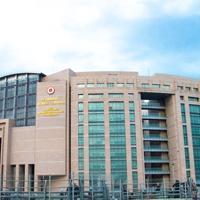
 Daily Agenda2 months ago
Daily Agenda2 months ago5 suspects nabbed for sharing information with Iranian intel
-
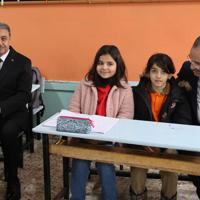
 Politics2 months ago
Politics2 months agoSoutheastern city enforces fines to tackle student absenteeism
-
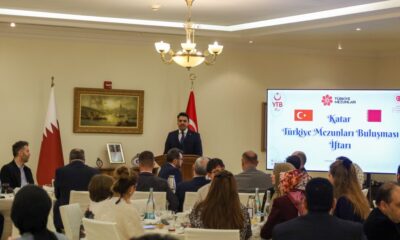
 Lifestyle2 months ago
Lifestyle2 months agoTürkiye’s Embassy in Doha hosts iftar for alumni to foster connections
-
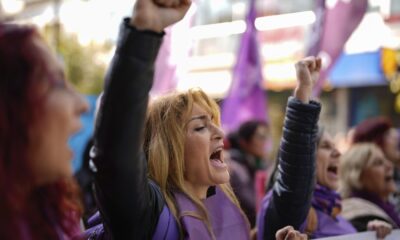
 Refugees2 months ago
Refugees2 months agoInternational Women’s Day: global protests demand equal rights
-

 Daily Agenda2 months ago
Daily Agenda2 months agoTrump hangi ülkelere yasak getirdi.
-
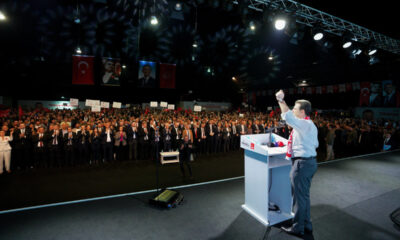
 Politics2 months ago
Politics2 months agoImpressions from İmamoğlu’s Antalya rally
-
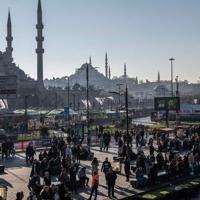
 Politics2 months ago
Politics2 months agoIstanbul ‘may break 110-year temperature record for March’
-

 Sports2 months ago
Sports2 months agoPaulista 19 maç sonra geri döndü, maç sonrası isyan etti

